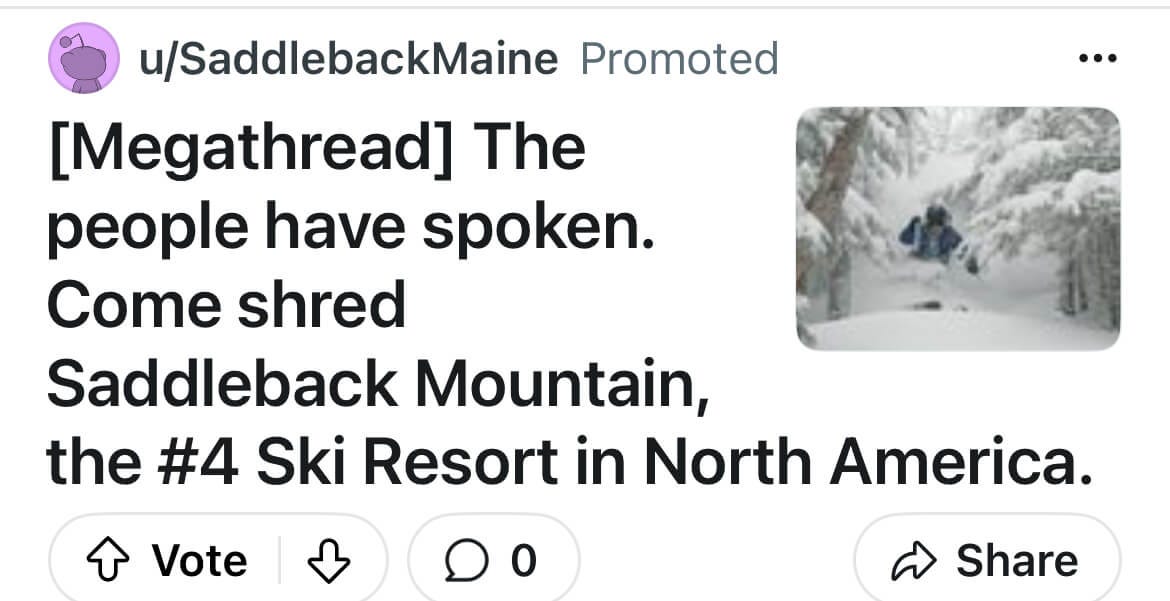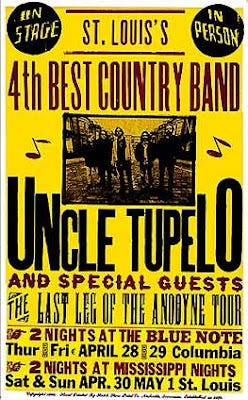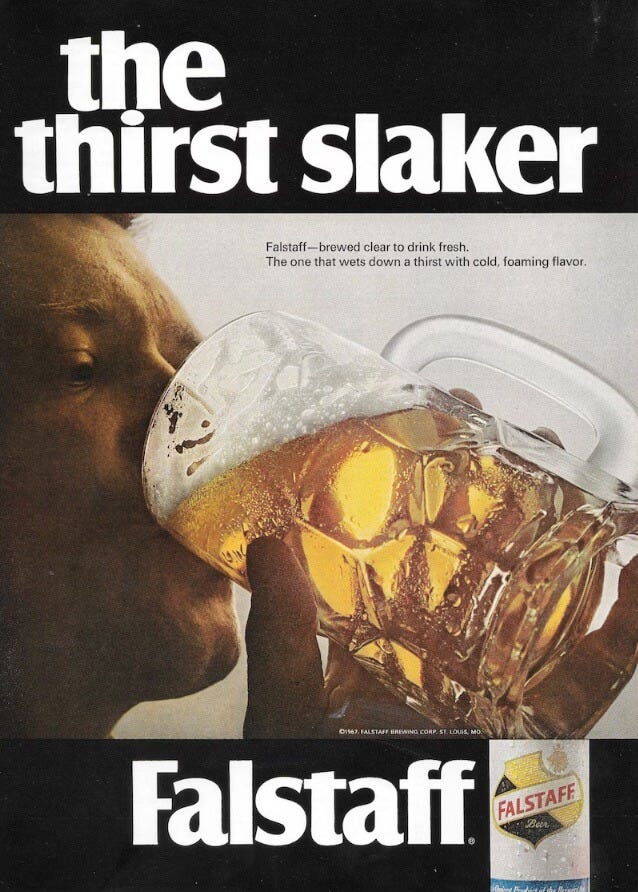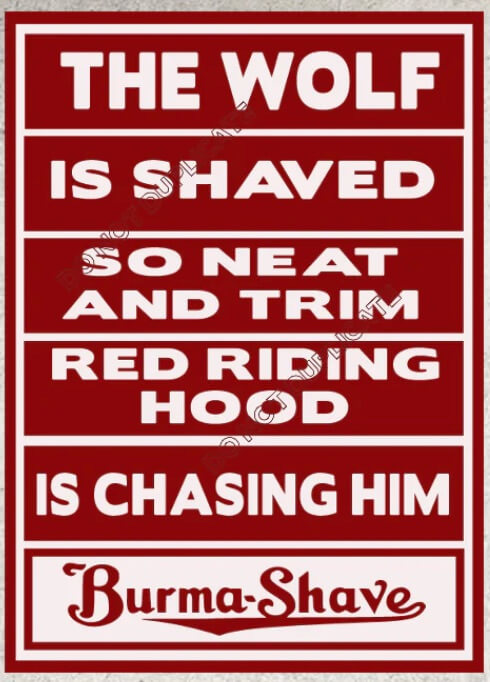Sometimes you should be the 4th best thingy
Here is a content distribution strategy you may not have considered
Hello Gobbledeers,
How’s it going?
Here’s a weird thing I’ve noticed:
If I start the newsletter by - let’s call a spade a spade - begging all of you to share the newsletter with people, for some reason I get fewer subscribers that week than if I didn’t start the newsletter with the begging. Weird.
Consider this a Schrödinger’s begging - I’m simultaneously begging you and not begging you to share the newsletter.
With that out of the way, today we’ve got:
Sometimes being in 4th place is actually the best place to be in
Slake your thirst
A surprising content distribution strategy
We’re First at Being Fourth
Everyone who has ever written anything about marketing has written about Avis Car Rental’s “We’re number 2. We try harder” campaign that began in the early 1960s.
Have I written about it? Yes. Is what I wrote particularly insightful? Obviously, no. (I may be second, but clearly I’m not trying harder.)
It’s here that I’ll point out that there are actually three things about the Avis “We’re number 2. We try harder” campaign that are notable:
After the campaign launched, the company and the ad agency surveyed consumers about how they felt about the ads. In the early 1960s when the ads launched, advertisements weren’t ironic or sarcastic, they were straightforward. Saying you were the second-best car rental company was an odd choice at the time. Consumers, it turned out, didn’t like the ads. But the agency (Doyle Dane Bernbach) believe so strongly in the concept that they told Avis to ignore the customer feedback and keep the campaign going. And Avis followed the agency’s advice (obviously they would fire the agency today). When I give presentations to marketing teams about gobbledy, I usually tell this story and quote Sylvia Plath, who wrote, “I am skeptical of people whose God is testing…”. In other words, sometimes you have to believe in the work you’re doing, even in the face of pushback. Also, I’m happy to speak at your next event. Really.
The copywriter who wrote “We try harder” is a woman named Paula Green, who also wrote the “Look for the union label” jingle. It’s worth watching the commercial I linked to - it’s so inconceivable, given the politics of our time, that a union pulled together enough money to work with an agency to create a campaign to tell people why they should buy American-made items, and that it didn’t cause a whole thing that tore the country apart. Or maybe it did…
In 2012, their at-the-time new CMO decided to move Avis away from the slogan. I’m not here to bash marketing folks for their work choices. God knows, I’ve made some stinkers. And please note that the person who made that decision has a great marketing job today. That said - if you ever find yourself running marketing for a company that has had an iconic 50-year-long marketing campaign, here are your choices:
Keep the thing. Maybe you hate it. Maybe you literally took the job because you thought, “finally, this is my chance to tell Tony the Tiger that they’re not GRRRRREEEAAT!” (or whatever). Don’t. Don’t do that. What are the odds that your idea of having Tony the Tiger say, “They’re full of minerals and non-GMO based corn!” will be better than “They’re GRRRRREEEAAT!” Just from an odds standpoint, it’s unlikely that your idea is better, no?
Get rid of the slogan or campaign or character or whatever. Again, what are the odds that Avis’ new tagline - which was “It’s Your Space,” btw - would be better than a tagline that’s been proven for 50 years? Even if, as the CMO told AdAge: [The new campaign is] “reflective of [Avis'] ongoing mission to be a customer-led, service-driven company, and presents the brand in terms of the customer experience and the advantages inherent in renting from Avis." You are actually just giving a future CMO the opportunity to say, “We’re returning to our roots and busting out ‘We Try Harder’…only this time, someone will be rapping.”
I was thinking about Avis after this ad came up on Reddit:
The #4 ski resort in North America.
This one was interesting to me - if it said “The #1 ski resort in North America” I bet I would’ve skipped right over it. My thought being, “I assume they’re using some sort of weird metric to say why Maine’s Saddleback Mountain, is the number 1 ski resort in North America” (which is to say, they are not the number 1 ski resort in North America.)
If you work for a small company in a space dominated by large players, saying that you’re the 4th best whatever-you-are is a great way to weasel yourself into the conversation. If you’re rated the “#3 CRM platform” it’s an effective way to get yourself into the consideration set behind Salesforce and Hubspot. In a market where there are 2 or 3 clear leaders, lots of prospective buyers want to see an alternative to the big players. But it’s very hard to know who else is worthy of consideration in that situation.
The solution? Tell everyone you’re #3! It’s not an Avis thing - you’re not saying you’re better BECAUSE you’re number 3 (though it’s easy enough to come up with reasons why you’re better because you’re number 3.) But often people are confused about the alternatives - a tagline can make it clear that you are the alternative.
My actual favorite example of this comes from alt-country pioneers Uncle Tupelo, who turned a reviewer’s knock on them into a poster for an upcoming gig1:
Slaking the Thirst for Money Words
We’ve been talking quite a bit here about what I’ve been calling “money words” - a word you can use in your copy that you can own and that your competitors cannot.
I’ve also been sharing older ads here because there was - shocker! - a period of time where companies believed - wait for it - that the words you used to talk about your product were actually important and had an impact on revenue. Seems hard to imagine, no?
Gobbledy old-heads may remember our deep dive into Schaefer beer, which positioned itself as the beer for people who might want to have like, I dunno, a gallon of beer in a sitting, as the script from one of their commercials discussed:
Schaefer - like any fine beer - tastes wonderful in that first cold glass. But - and this is what really sets Schaefer apart - the pleasure of this beer doesn’t fade after one glass or two. Even after your thirst is gone, the pleasure of ice-cold Schaefer keeps coming on. The last one is every bit as rewarding as your first.
There was also a jingle that helped you remember which beer you might want to order if you’re having, like, a gallon of beer (“Schaefer is the/one beer to have/when you’re having more than one.”).
Clear positioning + memorable jingle = even after you’ve had 11 beers, you’ll remember which one you should order.
But if you’re starting with print ads, you can’t use a jingle to worm your product into people’s brains. What you CAN do, though, is introduce a money word.
Here’s an ad from a long-running campaign from gone-but-not-forgotten beer company Falstaff.
“Slaker” is an absolutely brilliant money word. No other beer company is going to wrest “slaker” away from you. That’s yours.
I’m not sure I understand the copy in the body of the ad (what is “cold, foaming flavor”?) but it doesn’t matter because once you’ve absorbed “Thirst Slaker” you’re buying yourself a bunch of Falstaff.
It wasn’t just Falstaff. As a “great light beer” Schlitz needed to overcome customer fear that a light beer wouldn’t have enough beer flavor. They needed a word to alleviate that fear and convey that the beer had a significant amount of beer flavor (again, whatever that means). Behold:
“Gusto” is a helluva money word. How do you describe Schlitz’s flavor compared to other light beers? It’s got “gusto.” Goddamn that’s good.
Even the copy in the ad is evocative - “the first good swallow” and “the kiss of the hops.”
I know I keep harping on the money words, but for all of the time spent trying to figure out how your software is differentiated, almost no time is spent trying to figure out the money word that will sum up that difference. “Slake” is how Falstaff gets rid of your thirst in a way that no other beer can. “Gusto” is how Schlitz’s light beer flavor compares to other beers that lack it. The one word does all the heavy lifting. You can find yours (or hire me to work with you…just saying.)
(Thanks to Gobbledy reader and former roommate in my childhood bedroom, Dan B. for the beer ads).
Hub-a Hub-a
Before we get to this topic, we need to sit down and have a talk.
I trust that we are all adults here, and that we can have an mature conversation. I know I am capable of that.*
(*I am barely capable of that. A little side note: back when I was in elementary school, New Jersey was known for having a very progressive sex ed curriculum. As part of that curriculum, my 5th grade health teacher, Mrs. Berger, separated the boys and girls into different classrooms and taught some human sexuality stuff to each group. In our class she brought up, in a context and age appropriate way, some discussion of, uh, self-pleasure. As she shared educational material around this topic, I proceeded to laugh/cry so much that I fell off my chair and was kicked out of the room.)
Anyway, we can have a mature conversation, right? Right.
One of the things we like to talk about here is how your best chance at marketing success is to be the first one doing something. You can be the first pharmaceutical company to create a musical ad. Or you can be the first fragrance company to sponsor a concert tour. Or the first company to use a series of billboards on the highway to tell a little story.
I’ve mentioned this before, but in Margin Call, the 2011 movie about the financial crisis, a character played by Jeremy Irons says, in reference to Wall Street:
“There are three ways to make a living in this business: be first, be smarter, or cheat. I don’t cheat. And although I think we have some pretty smart people in this building, it sure is a helluva lot easier to just be first.”
I agree, it’s a helluva lot easier to just be first.
If everyone is posting content on LinkedIn to drive awareness of their software, you’re going to have to do something pretty incredible to compete for attention there.
But if there’s a place you can post content about your software company where nobody else is posting content, well it’s a helluva lot easier to just be first.
Which is why - in part - it might actually make sense that a YouTuber named Zara Dar2, who makes math education videos, is cross-posting those videos to, wait for it, Pornhub.
Here is a safe-for-work article about it (well, you know the subject of the content of the article and you can decide if it’s safe for where you work. Like I said, we’re all adults).
How well is this working? Her video explaining integrals has received more than 500,000 views on the adult platform.
Dar is quoted explaining her success and echoing Jeremy Irons’ sentiments:
“It could be because my SFW videos stand out against the typical NSFW content on the platform. That contrast might make them more intriguing or refreshing to viewers.”
In other words, you can make money being first.
How much money? She says that the CPMs (how ad rates are calculated) are 3x higher on the adult site than on YouTube.
Am I suggesting that you go this path?
Well, it depends what “this path” means. Should you find non-traditional distribution channels for your marketing content? Well, yes. It’s a helluva lot easier to be first.
Should you post on adult content sites, because, let’s be honest, your buyers are there? Probably not. Except…
I was really struck by something I read this week in the great media newsletter The Rebooting:
“Shamelessness is the most durable moat.”
Can’t disagree with that.
Posting your stuff on Pornhub? That takes real gusto.
You’ve made it to the end, congrats! The end is the best part. If you want to talk about gusto, non-traditional content distribution or whatever, your 7th favorite newsletter writer would be happy to do that. Here’s my Calendly link to set up a half hour…
I only included this because readers Jim J. and Russ S. would appreciate. I don’t expect you to care about Uncle Tupelo. But if you do - I’m always happy to talk about Uncle Tupelo!
I can’t decide if it’s a side note or a key piece of information, but Ms. Dar is also an OnlyFans creator, which means that it’s possible that posting her safe-for-work non-adult content to Pornhub is just a very, very clever content marketing play for her paid adult work.









I, for one, think Pornhub would benefit from more content on great B2B messaging.
I'm looking forward to the Gobbledy spin-off about elementary school or just fifth grade health class called "Thank You Mrs. Berger."